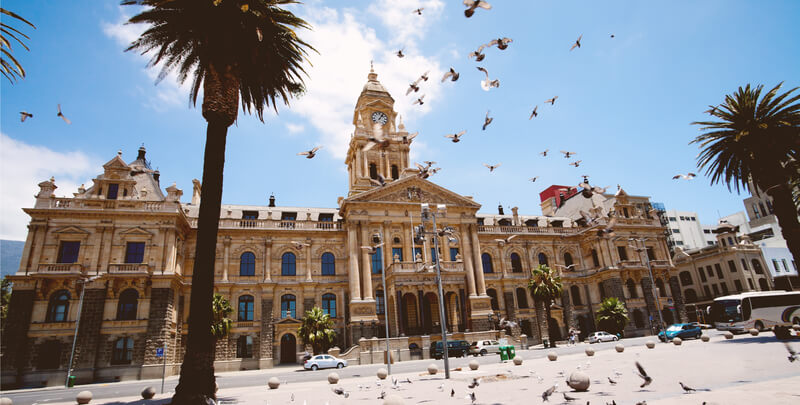HSBC Kinetic vs HSBC Business Account: Full Comparison
A complete head to head comparison for two HSBC account options for business: HSBC Kinetic vs Business Account, discover which is better for you.

South Africa is seen by many entrepreneurs and business owners as the gateway to Africa. With a world class financial industry (ranked 12 of 140 countries by the World Economic Forum), and a government encouraging business innovation, it’s a perfect place to set up operations.
In 2017, Johannesburg, South Africa will host the Global Entrepreneurship Congress, helping to cement its reputation as a cosmopolitan, commercial city.
If you’re thinking of starting a company in South Africa you’ll need a business bank account. Luckily, getting started needn’t be too difficult - here is a guide on how to open a South African business bank account.
The South African government offers a lot of information on their website about starting and growing a business in the country. Five basic types of corporate entities are recognised in South Africa, although there are variants on these types. The basic recognised legal company structures are:
Registering your company is done with the Companies and Intellectual Property Commission in South Africa. Details of the different variants on the company type, and the structures used for non-profit organisations, can be found on their website.
If you plan to carry out business in South Africa using a company which is incorporated elsewhere, you should register as a foreign company with the CIPC. Details on this process are available here.
If you register as a foreign company working in South Africa then you're required to open a local business bank account.
The documents you need to open a business bank account in South Africa depend largely on the type of business structure you have. This document list from Standard Bank is a good example of how the requirements vary across corporate entities.
It's crucial that you know in advance what documents you need to take to the bank, so call ahead to check. Typically you'll need to provide the following:
Some banks will require documents to be translated if they aren't already in one of the South African official languages.
Both residents and non-residents can open bank accounts in South Africa. When opening a business bank account, the most important detail is where your business is registered. If you have a South African registered business, this should be fairly easy to arrange.
If you get stuck, larger banks like FNB, offer specific help for non-residents looking to bank in South Africa.
It may be possible to open a business bank account from abroad, following the online application process (see below). If you're unable to go into a branch to present your documents, you'll be asked to provide notarised copies and signature samples before you can start using your account.
It's possible to open a business bank account online in South Africa. Nedbank, for example, claims that the application process takes only a few minutes. They can also assist you in registering with the CIPC if your business is not yet fully functional.
As the financial hub of Africa, South Africa has plenty of choice when it comes to opening a business bank account.
You could look for an international banking house that covers the globe, or one of the large South African financial institutions listed below. Typically these cover the larger African markets, and have a reach beyond the continent to other key financial capitals.
As South Africa’s largest bank, Standard Bank’s branch network covers 20 African countries and other key global markets. They have some options for established and new businesses, with the second type of account having some discounts on different services.
Nedbank is the third largest bank in South Africa by market capitalisation, and has a good branch and ATM network. There are several options for business banking, including current accounts with payment cards. These accounts also offer other perks such as access to a relationship manager. Nedbank’s website sets out the options and fee structure for small business accounts, making it easy to assess the products on offer.
The accounts on offer at Absa are targeted to businesses at different stages. Absa’s Bizstart account is designed for micro businesses of a couple of people, and offers similar services to accounts intended for more established companies. This account is available with the low monthly fee of R22. Alternatively, you can choose accounts which offer access to networking events and seminars to add value to your enterprise beyond simple banking solutions.
FNB split their business bank accounts by sector and business type, making it easy to narrow down the choices that might suit you. They have a handy comparison table on the website, which includes key features, benefits and fees, is a good place to start if you’re not sure of the right account for you.
Before you open your business bank account in South Africa, it's important to read the terms and conditions carefully - especially the section on banking fees and charges. The charges levied on accounts in South Africa might be quite different to what you're used to, so take some time to research the detail.
It’s common to find monthly account handling charges, and fixed fees for banking transactions. The account handling rates vary widely between banks and accounts, from as low as R22 for a simple account with Absa, to ten times that for an account with additional benefits with Standard Bank. Don’t forget that even when these fees look small, they can build up over time.
From time to time, most businesses need to make international money transfers - for example, to pay suppliers based overseas. For this type of transactions, banks often don’t offer the best available deal.
Even if the listed fees look quite low, your bank will make their cut on the deal. Instead of a transparent, up-front fee, you might find that your bank’s profit is rolled into a poor exchange rate. If your bank applies an exchange rate which is worse than the real mid-market rate, then you lose out as the true cost of your transfer is higher than it needs to be.
You can use an online currency converter to check the actual value of your money before you transfer internationally. If you do make a transfer, you might consider using an alternative service like Wise Business. Not only does Wise already offer the true exchange rate which you can find on Google, but since your international transfer is made with two local transfers in each respective country, large SWIFT transfer fees are also cut out, leaving you with more money in the end.
With Wise Business multi-currency account you can also earn a return on the money you hold.
*Please see terms of use and product availability for your region or visit Wise fees and pricing for the most up to date pricing and fee information.
This publication is provided for general information purposes and does not constitute legal, tax or other professional advice from Wise Payments Limited or its subsidiaries and its affiliates, and it is not intended as a substitute for obtaining advice from a financial advisor or any other professional.
We make no representations, warranties or guarantees, whether expressed or implied, that the content in the publication is accurate, complete or up to date.

A complete head to head comparison for two HSBC account options for business: HSBC Kinetic vs Business Account, discover which is better for you.

Check a HSBC vs Barclays business banking head to head comparison for business in the UK. Rundown on fees, features and account options.

Doing business overseas? Discover the best multi-currency accounts in the UK to receive and send money abroad.

A comparison of Wise Business vs. Revolut Business, covering accounts, features, fees and more.

A guide to the Starling sole trader account vs. business account, comparing the two on features, fees and eligibility.

A helpful guide on how to close a Revolut Business account, including a step-by-step guide.